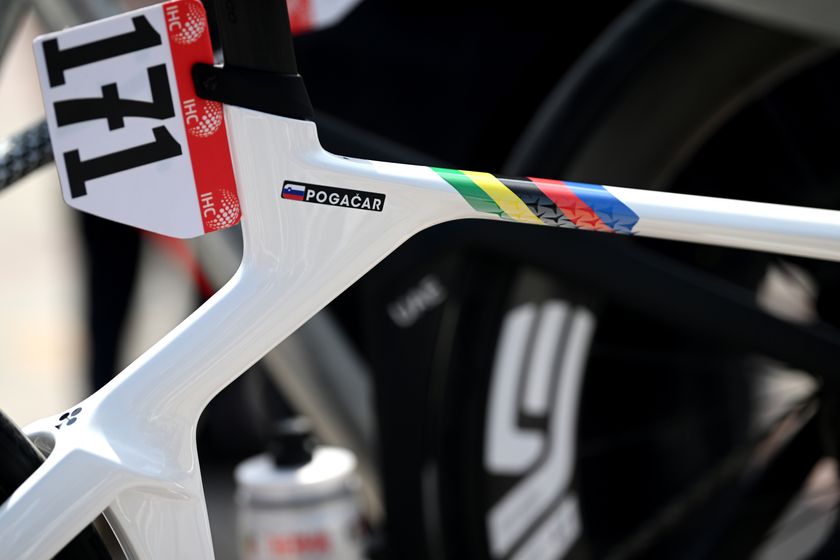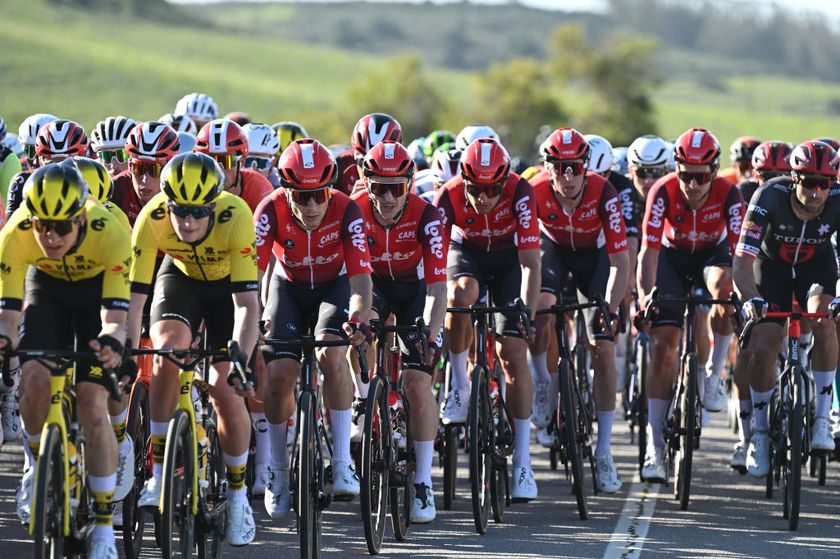Fairwheel Bikes creates stunning sequential shifting Di2-equipped hardtail
Unique electronic mountain bike on show at Interbike

















In the absence of Shimano's eventual release of an off-road version of its electronic transmission system, several companies and retailers have taken it upon themselves to create their own modifications – and most of the ones we've seen over the past few months have been very clever, if not downright brilliant.
Arizona-based retailer Fairwheel Bikes has crafted the best example we've seen yet. Sure, it's light and it's pretty with lots of anodized aluminum bits but the key feature is Fairwheel's custom designed electronic 'brain' that turns the 2x10 setup into a trick sequential shifting system using just one shifter.
In terms of user interface it's as simple as could be when set in 'race' mode: simply tap one button for an upshift and the other one for a downshift. According to Fairwheel's Jason Woznick, the custom brain calculates the gear inches and then shifts the front and/or rear derailleurs as needed to achieve the next logical ratio. Duplicate gears are ignored, too, and Woznick adds that the programming is designed to minimize cross-chaining and front derailleur shifts as well.
"As the bike sits, it's completely linear: two shift buttons, one for up and one for down," he said. "It can go from the 29/32T to the 42/11T hitting all thirteen equally spaced gears with only one front derailleur shift and without cross-chaining."
Alternatively, 'trail' mode allows for manual front and rear shifting as usual and full gear access across the entire range.
"When in manual mode, the two shifter buttons control just the rear derailleur, shifting it up and down as a normal Di2 system," Woznick told us. "To shift the front derailleur push both buttons at the same time. Since it's a double there's no need to tell it up or down, but just to shift. [Trail mode] isn't really that practical but it's still something we wanted as a possibility."
In fact, project software engineer Jeff Roberson says that, "really anything you can imagine is possible."
Get The Leadout Newsletter
The latest race content, interviews, features, reviews and expert buying guides, direct to your inbox!
The system is connected to a PC via a standard USB cable and from there, Roberson can load as many modes as he wants and can also program any button combination to swap in between them.
Not surprisingly, the execution is well crafted, with most internal wiring, a custom battery pack that resides inside the frame, and the custom brain built right into the inside of an Enve Composites carbon stem. And luckily for Fairwheel, Shimano's latest satellite shifter is already appropriate for the application as well.
The rest of the bike impresses too, with a custom Titus titanium 29er hardtail frame, a Cannondale Lefty fork, Enve Composites tubular rims and fat Dugast tires, plus a wealth of lightweight goodies from Tune and KCNC. Claimed weight as pictured is just 7.3kg (16.0lb) and Woznick says it was built to be ridden, not just for show.
"After Interbike, I plan on switching to a set of Enve clinchers for daily riding and using this bike a lot," he said. "I think endurance events are a great place for something like this as you don't have to think about shifting when mental fatigue sets in. The other place we see this as a big step forward is for people that have the use of only one hand."
That being said, potential buyers who might want one of these for themselves had better be prepared to pay big bucks. According to Woznick, the cost for just the bike itself is estimated at between US$12,000-13,000 but the costs surrounding the custom brain is almost innumerable.
"I can't really answer the price on the brain as it doesn't have a real price," he said. "The fabrication part was the small cost – paying someone to engineer, design and write the software that controls it as well as how to wire it into the system would be the largest part of the brain expense. We don't really have any solid plans on making these available because it isn't just plug and play. There really is so much customization that goes into something like this. Everything from figuring out how to wire it together without using the stock plugs from Shimano to setting up chain lines and building custom batteries that fit inside the frame. It's not something that could easily be put into a package and sold."
Fairwheel will also have a number of other choice items on display at its Interbike booth (though we'll have to wait until then to shoot images firsthand), including a semi-wireless Di2 system, a 2.85kg (6.28lb) road bike, and a custom three-speed internally geared fixie with Ashima hydraulic brakes.
Vegas, here we come!
Most Popular





